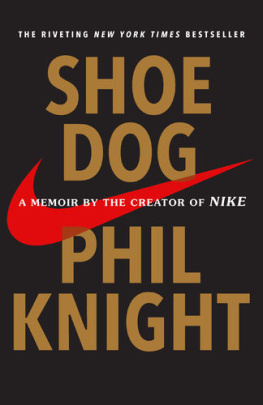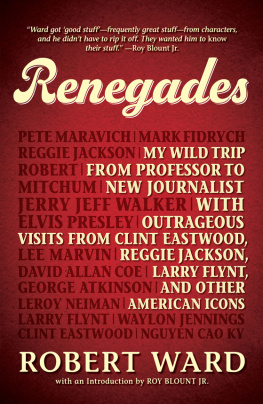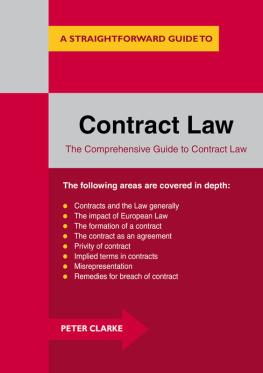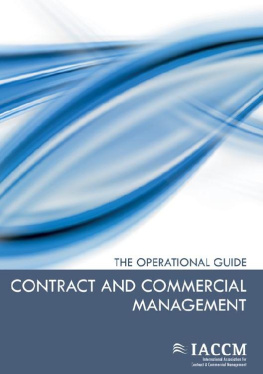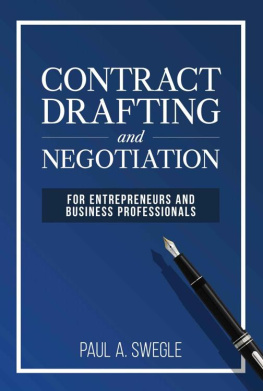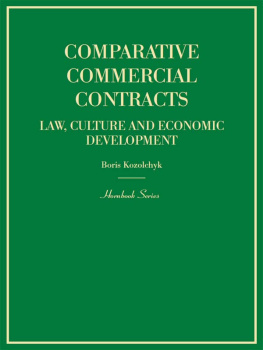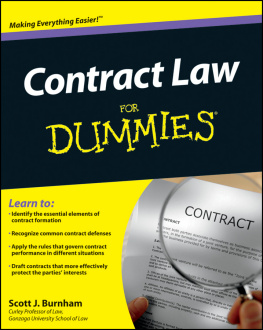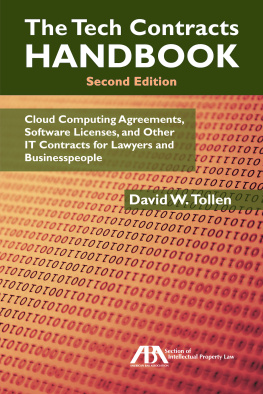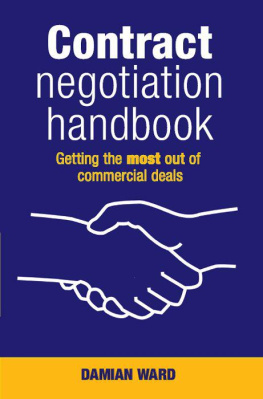Contents

First published in 2007 by Wrightbooks
an imprint of John Wiley & Sons Australia, Ltd
42 McDougall Street, Milton Qld 4064
Offices also in Melbourne
Damian Ward 2007
The moral rights of the author have been asserted
National Library of Australia Cataloguing-in-Publication data:
Ward, Damian Contract negotiation handbook: getting the most out of commercial deals. Includes index. ISBN 9780731407200 1. Negotiation in business. 2. Contracts. I. Title. 658.723
All rights reserved. Except as permitted under the Australian Copyright Act 1968 (for example, a fair dealing for the purposes of study, research, criticism or review), no part of this book may be reproduced, stored in a retrieval system, communicated or transmitted in any form or by any means without prior written permission. All inquiries should be made to the publisher at the address above.
Cover image Photodisc, Inc.
Wiley bicentennial logo: Richard J Pacifico
Disclaimer
The material in this publication is of the nature of general comment only, and does not represent professional advice. It is not intended to provide specific guidance for particular circumstances and it should not be relied on as the basis for any decision to take action or not take action on any matter which it covers. Readers should obtain professional advice where appropriate, before making any such decision. To the maximum extent permitted by law, the author and publisher disclaim all responsibility and liability to any person, arising directly or indirectly from any person taking or not taking action based upon the information in this publication.
For Caroline, Miles and Toby
About the author
Damian Ward is a partner in Home Wilkinson Lowry, an Australia-wide commercial law firm. He is an experienced commercial lawyer with a broad-based practice in contract law, property, defamation, trade practices and intellectual property. Damian has published many articles in these areas of law and has a monthly column in MIS magazine called Legally Binding.
Throughout his career, Damian has assisted countless clients to resolve disputes arising from contracts.
He can be contacted at < >.
Introduction
This book will help you get the most out of your commercial deals and contracts.
The commercial world can be a cold, hard place. There are hundreds of thousands of intelligent, hungry and astute people doing deals every day in Australia. Very few of them are suckers. Most know their business and what they want to get out of it on every level profit, growth and expansion.
When you are in such a competitive environment it is critical that you are prepared. This book will help you prepare for contract negotiations and to do the best possible deal you can.
As a lawyer who has been involved in negotiating many commercial contracts over the years, I have seen a kaleidoscope of behaviour from the incredibly astute to the widely speculative.
Some of those who have negotiated best are those without any formal education. Their insight, intuition and ability to manage the other parties has been educative to watch. At the other end of the spectrum have been those who have MBA or doctoral qualifications but proceeded through the deal with clumsiness and a lack of smarts. This reinforced a maxim I was given by a client when I was a junior lawyer: What you know is important, but whether you win or lose today depends on how you use it.
I have also assisted clients with my fair share of disputes over the years. What has ultimately compelled me to write this book is seeing too many people fall into traps that are easily avoided concentrating on the sexier or more cosmetically important parts of the deal to the detriment of the stuff drafted by the lawyers for the lawyers, as one client once told me.
If some of the lessons in this book had been employed at the outset, millions of dollars could have been saved and been better spent on business expansion and improving the bottom line rather than on lawyers in disputes neither party wanted to have.
In a slightly melancholy way, I suppose the other theme of this book is never to openly trust in the negotiation and performance of contracts. My view of contracts is that they are essentially a competition where both parties are seeking to obtain the maximum advantage for themselves. While there may not be winners and losers as there are in a sporting contest, often one party comes off second best. A contract negotiation is not a place for a group hug or to blindly rely on the word of your counterparties.
In my experience trust is directly related to leverage he or she with most leverage can be the most trusting. However, there are not that many contracts that Ive seen where the leverage is so one-sided as to give the more powerful or stronger party the right to be complacent.
Bearing in mind the general parallel of competition will help. Just as the person marking you in football or on the other side of the tennis court net is a competitor, so is your counterparty in a negotiation.
It is important not to mistake or merge competition with enmity. The best contractual negotiations, and ironically the best contracts as far as performance are concerned, tend to be between parties who negotiate hard for the strongest deal for themselves and both sides mutually recognise this. It develops a sense of respect. That respect in turn is the basis for performance of the contract.
This book is targeted at all people who negotiate contracts, from a junior procurement officer or small businessperson to a senior corporate executive.
From my observation, people at all levels in the commercial hierarchy can fall into similar types of traps and create problems for themselves and their businesses that could be avoided by more focus and preparation.
It is critical that what they want and need out of the deal is clearly known.
This book is in essentially three parts. They are:
- The contractual environment a user-friendly prcis of the law and the legal elements of a contract. I have placed an emphasis here on removing the jargon and unnecessary verbosity lawyers speak with in the hope of making what seem complex and strange ideas easily graspable concepts.
- Doing the deal from the first stage or baby steps to the final negotiation of the contract. I provide practical tips and assistance in this process.
- The end of the relationship the third part of the book addresses termination. In particular I deal with the situation where things end badly and a dispute arises.
The key word is preparation. I have often been surprised in the past by the confidence contract negotiators have had in doing a deal that meets all their needs and wants when in fact they are unprepared. They have not fully articulated those needs and wants to themselves let alone been in a position to negotiate the contract in a dynamic environment with a counterparty who wants as much as they can get in their own best interests.
If there is one message I would like contract negotiators to take away from this book, it is that there is no limit to the amount of preparation you can do at every level for the negotiation. A badly negotiated contract is like a two-storey brick house built on a foundation of sand. It may look good for a period of time but the sand shifts and the walls collapse. A negotiation that has been properly and completely prepared will generally see a house that lasts for as long as the owners want it to.
Given the competitive context of contractual negotiations, I cannot guarantee that after reading this book that you will necessarily have the upper hand in every negotiation and do deals that every time meet your hearts desire. Sometimes the bitter truth is that you will need to do deals with people who have more power, money and leverage. You are not in the position to get the deal you necessarily want.
Next page


